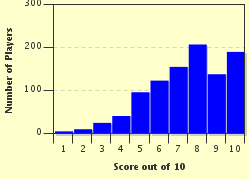Quiz Answer Key and Fun Facts
1. One of the hallmarks of any colonial economy is the imperial power's monopolization of production, and British East Africa (the colonial precursor to Kenya) was no exception. In 1932, the average British farm was over 2,400 acres in size, and even on the cusp of independence in 1960, British farms produced 83% of the colony's agricultural exports.
2. Most social historians of Kenya have taken special notice of the British settlers' work ethic. In contrast to the leisured country life of their homeland, most of the British in Kenya were widely acclaimed for their disciplined attention to duty, their long work hours, and their near-ascetic devotion to church and family values.
3. The history of Kenya leading up to the effort for independence is rife with the dispossession of tens of thousands of square miles of prime land in violation of numerous formal agreements; indeed, this is highly reminiscent of Euro-Americans' incursions into the lands of the Indians. Less well-known are Kenyan labor practices of the time, details of which are nigh-unbelievable to twenty-first century eyes. Which of these is true about African labor under the 1938 Kenya ordinance?
4. The Kikuyu Central Association was founded in the mid-1920s from the ashes of the banned East Africa Association. It became the predominant organization for African rights during the interwar period in Kenya. Who became its first general secretary in 1927?
5. African service in World War II went beyond the Carrier Corps that has characterized participation in World War I. Over 47,000 Africans enlisted for active duty - a number which would have been larger had the British settlers not blocked further recruitment because of the resulting labor shortage. Which of these was the most significant contribution of East African troops in this conflict?
6. In response to popular pressure, an African was finally seated on the Kenya Legislative Council in 1944. Who was the first African to hold this seat?
7. With the advent of World War II, the Kikuyu Central Association (KCA) was banned by the colonial government. It continued clandestinely until being replaced by a new organization in 1944: KAU. What does this acronym stand for?
8. In the years following World War II, African nationalism, and particularly Pan-African unity, became a powerful political force throughout the continent. What Swahili term meaning "freedom" came to represent this general sentiment that independence must come soon?
9. Prior to World War II, many African subsistence farmers without formal land rights, known in Kikuyu as "ahoi", worked excess land on informal agreements -- initially with African leaders, but increasingly with white settlers. In the postwar years, these "squatters" were increasingly evicted and driven into the landless bulk of the African populace or repatriated to African reserves. What motivated these mass evictions?
10. While in Britain, Kenyan expatriate Jomo Kenyatta helped organize the Fifth Pan-African Congress, a 1945 meeting of African leaders that served as something of an incubator for growing anti-imperialist sentiment. One participant, Kwame Nkrumah, would soon after become leader of the Convention People's Party (CPP). After years of activism, Nkrumah would become president of the first British colony in Africa to be granted independence, setting a pattern that would be followed by many other emerging African states, including Kenya. What country did Nkrumah lead to independence through agitation and diplomacy?
Source: Author
stuthehistoryguy
This quiz was reviewed by FunTrivia editor
bloomsby before going online.
Any errors found in FunTrivia content are routinely corrected through our feedback system.

